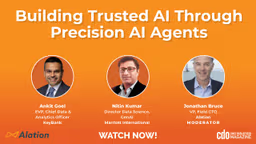Data Management
Democratizing Data Isn’t Enough, We Must Democratize How It’s Used — Maryland CDO
Written by: CDO Magazine Bureau
Updated 12:29 PM UTC, Wed April 2, 2025
Natalie Evans Harris, State CDO of Maryland, speaks with Leigh Sheldon, Partner, CEI Data and Analytics Lead, Guidehouse, in a video interview about her journey as Maryland’s state CDO, top three priorities for data modernization across the state, forming the office of enterprise data and its purpose, and her approach to data interoperability.
Reflecting on her journey as Maryland’s Chief Data Officer, Harris notes that it has been one of learning, collaboration, and laying the groundwork for a more connected and data-driven state government.
Since joining, she invested herself in understanding the landscape of Maryland’s data infrastructure. “I have been fortunate that I have a governor that is data-driven and heart-led,” says Harris.
Delving further, she adds that operationalizing data-drivenness has been core to the mission. Over the past year, she identified Maryland’s strong foundation in this space and says that the state has all the right pieces to be data-driven.
“Coming into the state of Maryland, my role has really been to learn where we are, set that groundwork, and then really start to move the agencies from being individual agencies to taking a more together and enterprise approach to how we leverage data and be more efficient around the ways that we do it.”
When asked about the top three priorities to modernize data across the state of Maryland, Harris states that the focus has always been on data-drivenness. She adds that the state needed no convincing about the value of data as leadership and agencies alike were aligned on its importance.
The top three priorities for data modernization, according to Harris, are:
Infrastructure
-
Governance
-
People
Elaborating, she says that Maryland is doubling down on technology and infrastructure to make data more accessible and useful. The efforts are focused on expanding existing platforms such as Maryland’s open data resources and award-winning GIS tools and transforming them into an enterprise-wide platform.
“It’s one thing to have access to the data, and it’s one thing to have technology and infrastructure. And it’s another thing to actually have the foundations for what it means to use data across the state,” says Harris. She mentions working closely with agencies to define what statewide governance, sharing, and management policies should look like.
Some key governance milestones include establishing the Statewide CDO Council, which gave every agency a seat at the table and a voice in shaping the state’s data strategy. This has enabled them to establish foundational goals for data usage and data-driven decision-making. The most important priority for Harris is the human side of the data equation. It is critical to ensure that once the infrastructure, guidance, policies, and procedures are in place, the people using the data also have the necessary skills and data literacy.
To that end, she mentions two key initiatives:
-
A statewide data literacy program
-
The Maryland Data Academy
“We’ve seen AI and other technologies democratize data and make it easier to access; just as much concerted effort needs to be in democratizing the knowledge and how to use the data.”
In her first year as Maryland’s Chief Data Officer, Harris’s foundational achievement has been the creation of the CDO Office. She considers this a key step toward the governor’s vision of a data-driven state and to operationalize a culture and infrastructure of data-drivenness.
Harris led the formation of the Office of Enterprise Data, anchoring its purpose in listening and learning. She affirms that listening tours and maturity assessments helped the office to comprehend the landscape, understand what agencies needed, the challenges, and their approach to effective utilization of data.
Sharing data, Harris states that people working on data spend 30% of their time finding the right data and figuring out what agreements are needed to share and use it effectively. The Office of Enterprise Data aims to solve this problem by making data more usable and accessible, ensuring responsible usage of compliant data.
The goal of the office is to deliver data as a service in a way that connects those who need to use data with those who need to communicate the stories it reveals about communities. She mentions making this process seamless, even enabling it through natural language tools, so that data becomes more accessible and meaningful to a wider range of users.
Furthermore, Harris adds, “What we’ve learned working with the agencies is that if we can make it easier for them to mature their programs, they’ll then make it easier for everybody else to use the data.”
Speaking of data interoperability challenges, Harris states that Maryland operates as a federated state, and she supports that structure. She acknowledges not being an expert in the health or housing domains and that the agency data officers are, and they are best positioned to determine the data management.
Thereafter, Harris confirms that her focus is on creating an environment where agency leaders can continue to specialize while enabling broader collaboration. Interoperability, in this context, is not about merging all data systems into one. Instead, it is about setting shared standards that make communication and data exchange across agencies easier and more effective, she notes.
Concluding, Harris states that interoperability also boils down to creating a shared language and data modeling. These APIs and interactions enable agencies to remain autonomous and focus on individual data needs while still aligning with a statewide lens to work collectively across environments.
CDO Magazine appreciates Natalie Evans Harris for sharing her insights with our global community.





